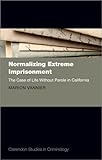Normalizing extreme imprisonment : the case of life without parole in California / Marion Vannier, University of Manchester.
Series: Clarendon studies in criminologyPublisher: Oxford, United Kingdom ; New York, NY : Oxford University Press, 2021Copyright date: ©2021Edition: First editionDescription: xvi, 212 pages ; 22 cmContent type:- text
- unmediated
- volume
- 9780198827825
- 0198827822
- Life imprisonment -- California
- Corrections -- California
- Sentences (Criminal procedure) -- California
- Imprisonment -- California
- Prison-industrial complex
- Réclusion à perpétuité -- Californie
- Services correctionnels -- Californie
- Sentences (Procédure pénale) -- Californie
- Emprisonnement -- Californie
- Complexe industriel carcéral
- Sentences (Criminal procedure)
- Prison-industrial complex
- Imprisonment
- Corrections
- Life imprisonment
- California
| Item type | Current library | Status | Barcode | |
|---|---|---|---|---|
 Open Access Books - Publishers
Open Access Books - Publishers
|
National Law School | Available | OABP313 |
Includes bibliographical references (pages 183-208) and index.
The origins of LWOP in California -- Campaigning for LWOP -- Settling and pleading for LWOP -- Prisoners' experiences of LWOP -- Normalizing extreme imprisonment.
"A critical, theoretical, and empirical examination of life imprisonment without the possibility of parole (LWOP) is long overdue. This book presents a unique case study of the 'normalization' of LWOP. More specifically, it explores the ties between LWOP's normalization and death penalty abolitionism, using California as a case study. Drawing on rich empirical research, it brings together relevant literature in criminology, the sociology of punishment, social policy, and sentencing to provide insights into the nature of American penal politics, the role of progressive pressure groups, and the relationship between life imprisonment and capital punishment. This study investigates the extent to which members of civil society who challenge capital punishment (lawyers, non-profit organizations, and lobbyists) have helped normalize LWOP by fostering the belief that it is humane and merciful. The monograph focuses on three domains where anti-death penalty activists have lobbied, campaigned, pled for, and agreed to LWOP; Congress, the political sphere, and courtrooms. For each domain, the book teases out the motivations of the main actors and agencies involved. It analyses the constraints under which they considered themselves to be operating, and the relationship between these motivations and the broad social, legal, and political environment in which they unfolded. Particular attention is paid to actors' understandings of the concepts of 'life' and 'death' in punishment."-- Provided by publisher
There are no comments on this title.
